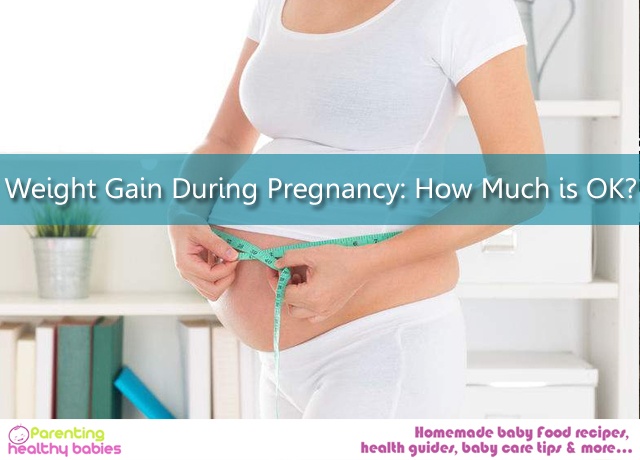Weight Gain During Pregnancy
Your initial weight is the deciding factor of how many pounds you should gain during your pregnancy. Now, pounds to be gained also depends on the factor whether you are going to be blessed with twins or a single baby. For a mother to be, of a single baby, try to gain 28-40 pounds if you are underweight. Aim for 25-35 pounds if you initially have a normal weight and gain 15-25 if you are overweight and similarly put on 11-20 pounds if you are obese. On the other side, if you are expecting twins, you goal weight apparently goes a little higher.
In case you are underweight, gain 50-62 pounds, 37-54 if you had a normal weight initially, 31-50 pounds if you are overweight and 25-42 if you are obese. However, if you are pregnant with a single baby, you should intake at least 300 calories per day in the beginning of your 2nd trimester. Check with your doctor if you are having twins because that means you will need more calories. Consult your doctor and set you aims accordingly. Gain your weight steadily because gaining too much of weight can also lead to problems of high blood pressure and increases your chances of C-section. Moreover, eat a healthy and nutritious diet. It is extremely important that you ask you ask your doctor or health care provider of the amount that you particularly should or need to gain.
Read More: 11 Surprising Ways to Gain Pregnancy Weight
Gain the right amount of weight:
If your health care provider has recommended you to gain some weight during pregnancy, some of these might be of major help to you-
- Aim to have at least five to six small meals everyday.
- Add mashed potatoes, cereal and scrambled eggs to non fat powdered milk.
- Peanut butter is essentially important if you are trying to gain weight. A tablespoon of peanut butter provides 100 calories and 7 grams of protein. You can spread it on toast, apples, bananas, celery or toast.
- Try to add extras to your meal such as cream cheese, sour cream, cheese or butter.
7 tips for healthy pregnancy weight gain:
If your health care provider has recommended you to gain some weight during pregnancy, some of these might be of major help to you-
- Aim to have at least five to six small meals everyday.
- Add mashed potatoes, cereal and scrambled eggs to non fat powdered milk.
- Peanut butter is essentially important if you are trying to gain weight. A tablespoon of peanut butter provides 100 calories and 7 grams of protein. You can spread it on toast, apples, bananas, celery or toast.
- Try to add extras to your meal such as cream cheese, sour cream, cheese or butter.
- Have a snack or meal that serves turkey as this will add more calories to and supply more protein.
- Focus on nutritious foods such as eggs for protein, fruit for fiber and nutrients, low fat milk for calcium etc.
- Breakfast cereal is full of fiber and is a must in the morning if you are aiming to add a little weight.
What if you gain too much of weight?
Oftentimes what happens is that you gain more weight than what was initially planned. In such cases, talk to your doctor and discuss your weight issues with him/her. Most of the times, you have to wait until after delivery to start losing your weight again. But you can still slow down your gaining weight and take it at slow pace.
- Stop adding salt to foods because salt causes you to retain water.
- Go for healthier preparation methods. Do not fry your food in oil, butter as this will lead to more calories and fat. Rather. Bake, boil or grill your food.
- Exercise. Consult your health care provider for which exercise will be suitable for you and go accordingly.
- Lower your intake of sweets and high calorie snacks such as doughnuts, cakes, syrup, honey, potato chips. Try low fat yogurt, fresh fruit, strawberries.
- Avoid whole milk products. Choose low fat or fat free cheese yogurt. Use skim milk as this reduce the amount of calories and fat.
What happens to the extra weight during pregnancy?
- Placenta: 8 pounds
- Placenta: 2-3 pounds
- Amniotic fluid: 2-3 pounds
- Breast tissue: 2-3 pounds
- Blood supply: 4 pounds
- Breastfeeding and delivery: 5-9 pounds
- Larger uterus: 2-5 pounds
- Total: 25-35 pounds
Pattern you can follow:
- There is not much need for you to gain weight during the first trimester, it can only be 0-2 kg.
- gain 1-2kg per month in the second and third trimester. Steady weight gain is important as this will lead to the development and growth of the baby.
It is generally believed that you should eat for two during the pregnancy but this is not at all true. Instead you should focus on your calorie intake and make sure that it does exceed 300 calories per day during the first trimester. Make sure that you weight gain does not exceed the prescribed limits as this may lead to several complications during your pregnancy. It can be high blood pressure, fatigue, backache, delivery complications, gestational diabetes. This may happen because of increased fetus weight due to high storage of fat tissues around the milk glands which may lessen the milk secretion.
- If you are suffering from diabetes, it is especially recommended you start your pregnancy with a healthy BMI. Consult a doctor so that they tell you about your diet. It is very important for you to maintain your blood sugar levels and take a healthy diet for yourself and your baby. There are a number of hospital where there is a special team of doctors who look after to be mothers with diabetes.
Weight gain guidelines:
For a mother to be, of a single baby:
- try to gain 28-40 pounds if you are underweight.
- Aim for 25-35 pounds if you initially have a normal weight.
- Gain 15-25 if you are overweight.
- Similarly put on 11-20 pounds if you are obese.
On the other side, if you are expecting twins:
- Your goal weight apparently goes a little higher. In case you are underweight, gain 50-62 pounds.
- 37-54 if you had a normal weight initially.
- 31-50 pounds if you are overweight.
- 25-42 if you are obese.
Is it safe to lose some weight during pregnancy?
Oftentimes what happens is that you gain more weight than what was initially planned. In such cases, talk to your doctor and discuss your weight issues with him/her. Most of the times, you have to wait until after delivery to start losing your weight again. But you can still slow down your gaining weight and take it at slow pace.
- Stop adding salt to foods because salt causes you to retain water.
- Go for healthier preparation methods. Do not fry your food in oil, butter as this will lead to more calories and fat. Rather. Bake, boil or grill your food.
- Exercise. Consult your health care provider for which exercise will be suitable for you and go accordingly.
- Lower your intake of sweets and high calorie snacks such as doughnuts, cakes, syrup, honey, potato chips. Try low fat yogurt, fresh fruit, strawberries.
- Avoid whole milk products. Choose low fat or fat free cheese yogurt. Use skim m ilk as this reduce the amount of calories and fat.













